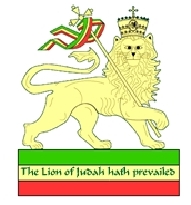
The Revised Constitution of Ethiopia , November, 1955
HIM - Ethiopian Man of the Millennium
Living Fons Honorum Aethiopiae
An Excerpt of The Revised Constitution of Ethiopia , November, 1955
Article One
The Empire of Ethiopia comprises all the territories, including the islands and the territorial waters, under the sovereignty of the Ethiopian Crown. Its sovereignty and territory are indivisible. Its territories and the sovereign rights therein are inalienable. All Ethiopian subjects, whether living within or without the Empire, constitute the Ethiopian people.
Article Two
The Imperial dignity shall remain perpetually attached to the line of Haile Sellassie I, descendant of King Sahle Sellassie, whose line descends without interruption from the dynasty of Menelik I, son of the Queen of Ethiopia, the Queen of Sheba, and King Solomon of Jerusalem.
Article Three
The succession to the Throne and Crown of the Empire by the descendants of the Emperor and exercise of the powers of Regency shall be determined as hereinafter provided.
Article Four
By virtue of His Imperial Blood, as well as by the anointing which He has received, the person of the Emperor is sacred, His dignity is inviolable and His power indisputable. He is, consequently, entitled to all the honours due to Him in accordance with tradition and the present Constitution. Any one so bold as to seek to injure the Emperor will be punished.
Article Five
The order of succession shall be lineal, and only male, born in lawful wedlock, may succeed male; the nearest line shall pass before the more remote, and the elder in the line before the younger.
Conformity with the provisions of this Article and the following Articles 6 - 16, a special law shall determine the order of, and the qualification for, the succession.
Article Six
Among those entitled to the succession shall be reckoned also the son unborn, who shall immediately take his proper place in the line of succession the moment he is born into the world.
Article Seven
In the event that, at the time of His succession to the Throne and Crown, the Emperor shall have attained the age of eighteen years, He shall, on the day determined by Him, but in any event not later than one year after His succession to the Crown, be anointed and crowned as Emperor, the provisions and details of the Coronation being determined in the Coronation Ceremonial of the Ethiopian Orthodox Church of 2nd November, 1930.
Article Eight
Regency shall exist in the event that the Emperor is unable to exercise the Imperial Office whether by reason of minority, absence from the Empire, or by reason of serious illness as determined by the Crown Council. In such cases the Regency shall exercise in the name of the Emperor all the powers and prerogatives of the Crown, except that the Regency shall have no power to grant the title of Prince, and shall have caretaker powers only as regards the properties of the Crown and of the Emperor. Regency shall automatically terminate upon the cessation as regards the Emperor, of the conditions having given rise to the Regency, in accordance with the provisions of the present article. Regency shall be exercised respectively in the situations as provided for in Article 9 and 11, by the person or by the Council as provided for in Articles 10 and 11.
Article Nine
In the event that the Emperor or in the event that the Crown Prince or the Heir Presumptive, in the situations provided for in Article 11, shall not have attained the age of eighteen years, the Regency shall be exercised by the Council of Regency as provided for in Article 11.
Article Ten
The Council of Regency shall consist of the Empress Mother, the two descendants of the line of Sahle Sellassie most nearly related to the Emperor, as determined by the Crown Council, having reached the age of eighteen and being of sound mind, the Archbishop, the Prime Minister, the President of the Senate and the President of the Chamber of Deputies. The President of the Council of Regency shall be the Empress Mother, or, in Her absence, the Prime Minister. No decisions of the Council of Regency shall be taken except by a majority vote of two-thirds of the Members thereof.
Article Eleven
Regency shall be exercised by the Crown Prince or the Heir Presumptive, as the case may be, in case of the serious illness, or absence of the Emperor from the Empire. However, in the event that the Crown Prince or the Heir Presumptive, as the case may be, himself shall be subject to serious illness, or shall be absent from the Empire, or shall not have attained his eighteenth year, the Regency shall be exercised by the Council of Regency, which shall automatically relinquish its functions to the Crown Prince of the Heir Presumptive, as the case may be, upon the cessation of any such disability of the Crown Prince or the Heir Presumptive, as the case may be. Serious illness of the Crown Prince or the Heir Presumptive, as the case may be, shall be determined by the Crown Council.
(Upon the death of His Imperial Majesty Amha Sellassie, Crown Prince Zere Yacob became Regent of and Head of the Family of the Solomonic Crown. Until such time as the Monarchy is reestablished by the People of Ethiopia, His Imperial Highness, the Crown Prince is the sole Fons Honorum Aethiopae of the Crown and the only Person allowed by the Imperial Constitution of 1955 to grant the Imperial Honors of Ethiopian and the Solomonic Dynasty.)
Imperial Ethiopian Order of Saint Mary of Zion
Imperial Ethiopian Order of Baronets
Excerpts from the Consitiution of 1955
Last Updated: September 10, 2005
www.SolomonicCrown.org